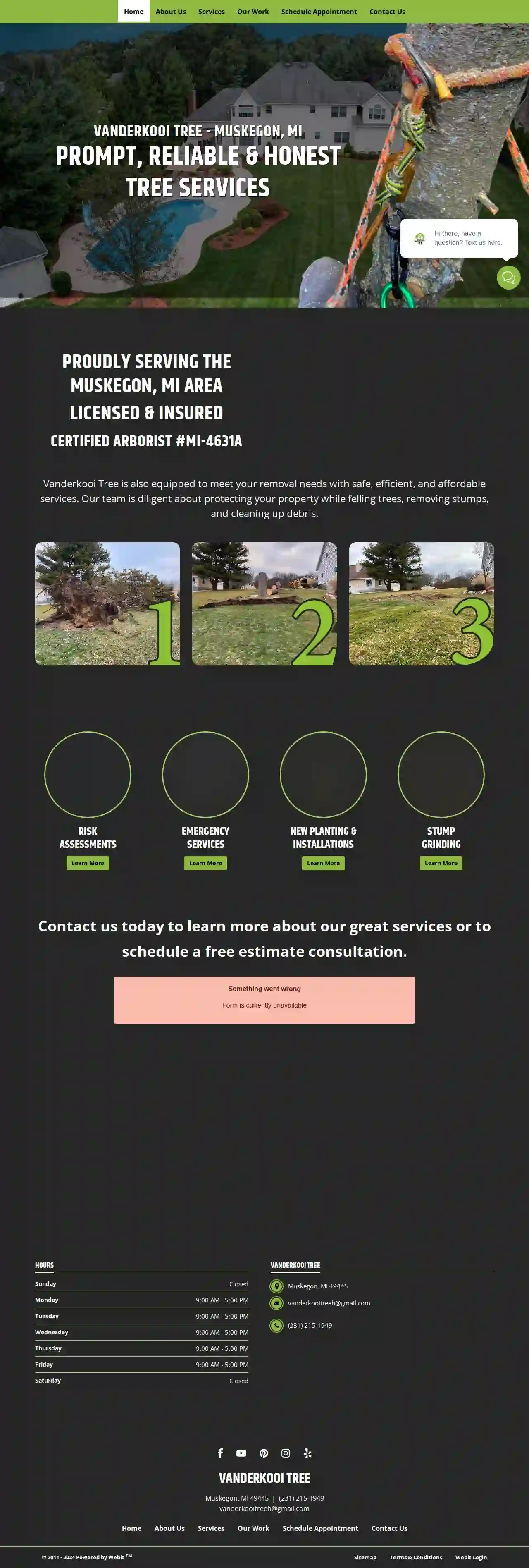Tree Service Milford
Find top Tree Services in Milford
Get 3 FREE Tree Service quotes for your project today! Compare profiles, reviews, accreditations, portfolio, etc... and choose the best offer.

Lathans Lawn Care and Maintenance LLC
55 reviewsLathan's Lawn Care and Maintenance, Grand Rapids, 616, USLathan's Lawn Care and Maintenance has been providing quality services to clients since 2000. They offer a variety of services including lawn care, winter snow removal, weed control, mulch and fertilizer, gutter cleaning, tree removal/trimming, and more. Their team is experienced and friendly, ensuring professionalism, efficiency, and exceptional results.
- Services
- Why Us?
- Gallery
Get Quote
The Visiting Arborists
55 reviewsLansing, MI, 48906, USThe Visiting Arborists is a tree consulting service based in Lansing, MI, offering a range of services including Tree Health Care Plans, Tree Risk Assessment, Oak Wilt Management Plans, Tree Value Appraisal, and Tree Construction Protection. The business is led by Paul Dykema, a certified arborist with over 30 years of experience in urban forestry and tree care. The Visiting Arborists aim to provide expert advice and solutions for tree-related issues, ensuring the health and safety of trees and their owners.
- Services
- Why Us?
- Accreditations
- Our Team
- Gallery
Get Quote
Backwoods Tree Service
4.934 reviews123 Main St, Suite 101, Flint, 48506, USBackwoods Tree Service, LLC is a fully insured and experienced tree service company dedicated to providing professional, on-time, and dependable services. Our mission is to meet and exceed customer expectations and standards. We offer a wide range of services including 24hr emergency service/insurance work, storm clean-up, tree pruning/trimming, tree cabling and bracing, tree removal, stump grinding, land clearing/lot clearing, brush mowing, debris removal, and year-round services. We ensure that all tree removal is 100% recycled and nothing goes to waste.
- Services
- Why Us?
- Accreditations
- Our Team
- Testimonials
- Gallery
Get Quote
American Made Tree Service, Inc.
5115 reviews123 Main St, Livonia, 48150, USAmerican Made Tree Service Inc. is an experienced tree and stump removal service with satisfied customers throughout Livonia, Michigan and surrounding cities. We are fully-insured and licensed with 10 years of experience.
- Services
- Why Us?
- Accreditations
- Our Team
- Testimonials
- Gallery
Get Quote- AB
AB Backwoods TREE Services
4.915 reviewsMenlo Park, CA, 1 Hacker Way, 94043, USFacebook is a social networking platform that allows users to connect with friends, family, and colleagues. It provides various features such as messaging, video calling, sharing photos and videos, joining groups, and more. Facebook aims to give people the power to build community and bring the world closer together.
- Services
- Why Us?
- Accreditations
- Our Team
- Testimonials
- Gallery
Get Quote 
Chapin Services, LLC
4.884 reviewsP.O. Box 3292, Kalamazoo, 49003, USChapin Services, LLC is a local tree care expert that helps keep homes safe from tree hazards. They specialize in creating elegant outdoor living spaces by combining book knowledge with hands-on experience. Their goal is to enhance the safety and aesthetics of homes, raise property value, and beautify neighborhoods through expert tree care.
- Services
- Why Us?
- Accreditations
- Our Team
- Gallery
Get Quote
Vena's Nursery
4.9117 reviews21111 Clark Rd, Belleville, MI 48111, 48111, USWelcome to Vena’s Nursery of Belleville MI, a second generation owned business started in 1948 by Julio Vena and Bessie Vena. The business has been family owned and operated ever since. Vena’s Nursery has over 33 acres of maintained trees and shrubs, offering a variety of trees and shrubs for sale and services including tree transplanting, tree removal, stump grinding, and more.
- Services
- Why Us?
- Accreditations
- Our Team
- Testimonials
- Gallery
Get Quote
Parshall Tree Care Experts
55 reviews202 S Union St, #215, Traverse City, 49685, USParshall Tree Care Experts is a leading provider of tree care services in Grand Rapids and West Michigan. They offer a wide range of services including tree removal, proactive pruning and maintenance, stump grinding, 24-hour emergency services, insect and disease control, injection treatment, integrated pest management, and deep root feeding. Their team of experts leverage advanced technology and equipment to deliver state-of-the-art solutions to clients.
- Services
- Why Us?
- Accreditations
- Our Team
- Testimonials
- Gallery
Get Quote
M&A All Seasons Tree Service
4.953 reviewsSuite 137, Grand Haven, MI, 101 Washington Ave., 49417, USM&A All Seasons Tree Service is a professional tree removal company based in Grand Haven, Michigan. With over 30 years of experience, they provide a range of services including tree removal, tree trimming, stump grinding, lot clearing, and 24/7 emergency calls. Their team is dedicated to delivering high-quality services at affordable prices, ensuring customer satisfaction and safety. They serve various locations in West Michigan, including Grand Haven, West Olive, Holland, Spring Lake, Allendale, Muskegon, Ferrysburg, and Fruitport.
- Services
- Why Us?
- Accreditations
- Our Team
- Testimonials
- Gallery
Get Quote
Vanderkooi Tree LLC
4.426 reviewsMuskegon, MI, 49445, USVanderkooi Tree is a locally owned and operated business in Muskegon, MI, providing expert tree removal and tree maintenance services. Our team of certified arborists is dedicated to customer satisfaction and offers top-quality service at competitive rates. We specialize in tree removal, pruning, trimming, risk assessments, emergency services, new planting, installations, and stump grinding.
- Services
- Why Us?
- Accreditations
- Gallery
Get Quote
Over 16,467+ Tree Surgeons onboarded
Our tree care pros operate in Milford and surrounding areas!
TreeServiceMatch has curated and vetted the Best Tree Surgeons in Milford. Find the most trustworthy pro today.
Frequently Asked Questions About Tree Services
- Communication: The first step is to talk to your neighbor and explain the issue. They may be willing to trim the roots or remove the tree if it's causing damage.
- Root Pruning: You can cut back the roots at the property line, but it's essential to do this carefully to avoid damaging the tree. Consult with a certified arborist for guidance on proper root pruning techniques.
- Root Barrier Installation: Installing a physical barrier, such as a thick plastic sheet or metal edging, can prevent roots from growing into your yard. The barrier should be at least 2 feet deep and extend several feet from the trunk.
- Chemical Control (Not Recommended): Chemical root killers are available, but they are generally not recommended due to potential environmental damage and the risk of harming the tree.
- Leaf discoloration or spots: Yellowing, browning, or spotting on leaves can indicate fungal infections, nutrient deficiencies, or other problems.
- Premature leaf drop: Losing leaves earlier than usual or outside of the normal seasonal cycle can be a sign of stress or disease.
- Dieback of branches: Branches dying from the tips inward can indicate disease, insect infestation, or drought stress.
- Cankers or lesions: Sunken or discolored areas on the bark can indicate fungal or bacterial infections.
- Mushrooms or conks growing on the trunk or roots: These are often signs of decay fungi.
- Wilting or drooping leaves: Can indicate a lack of water, root damage, or vascular disease.
- Online directories: Use reputable online directories like TreeServiceMatch to find and compare local tree service companies.
- Ask for recommendations: Seek referrals from friends, family, neighbors, or local garden centers.
- Check online reviews: Read reviews and ratings on websites like Google, Yelp, and Angie's List.
- Verify credentials: Ensure the company is licensed, insured, and employs certified arborists. You can check with your local licensing board or professional arborist associations.
- Get multiple quotes: Contact several companies for quotes and compare their pricing, services, and experience.
- Meet with potential companies: Schedule consultations with a few companies to discuss your needs, ask questions, and get a feel for their professionalism and expertise.
- Shallow Soil: In areas with thin or compacted soil, roots may not be able to penetrate deeply and instead grow near the surface.
- Soil Compaction: Heavy foot traffic, construction activities, or vehicles can compact the soil, making it difficult for roots to grow downward.
- Low Oxygen Levels: Roots need oxygen to survive, and in poorly drained or compacted soil, they may grow near the surface to access more oxygen.
- Seeking Nutrients: Roots may grow towards areas with higher nutrient concentrations, which can be near the surface in some cases.
- Tree Species: Some tree species are naturally prone to surface roots, such as maples, willows, and poplars.
- Age: As trees age, their root systems expand, and some roots may naturally grow closer to the surface.
How do I stop my neighbor's tree roots from growing into my yard?
How do I know if my tree is diseased?
How do I find a reputable tree service near me?
Why do tree roots grow above ground?
How do I stop my neighbor's tree roots from growing into my yard?
- Communication: The first step is to talk to your neighbor and explain the issue. They may be willing to trim the roots or remove the tree if it's causing damage.
- Root Pruning: You can cut back the roots at the property line, but it's essential to do this carefully to avoid damaging the tree. Consult with a certified arborist for guidance on proper root pruning techniques.
- Root Barrier Installation: Installing a physical barrier, such as a thick plastic sheet or metal edging, can prevent roots from growing into your yard. The barrier should be at least 2 feet deep and extend several feet from the trunk.
- Chemical Control (Not Recommended): Chemical root killers are available, but they are generally not recommended due to potential environmental damage and the risk of harming the tree.
How do I know if my tree is diseased?
- Leaf discoloration or spots: Yellowing, browning, or spotting on leaves can indicate fungal infections, nutrient deficiencies, or other problems.
- Premature leaf drop: Losing leaves earlier than usual or outside of the normal seasonal cycle can be a sign of stress or disease.
- Dieback of branches: Branches dying from the tips inward can indicate disease, insect infestation, or drought stress.
- Cankers or lesions: Sunken or discolored areas on the bark can indicate fungal or bacterial infections.
- Mushrooms or conks growing on the trunk or roots: These are often signs of decay fungi.
- Wilting or drooping leaves: Can indicate a lack of water, root damage, or vascular disease.
How do I find a reputable tree service near me?
- Online directories: Use reputable online directories like TreeServiceMatch to find and compare local tree service companies.
- Ask for recommendations: Seek referrals from friends, family, neighbors, or local garden centers.
- Check online reviews: Read reviews and ratings on websites like Google, Yelp, and Angie's List.
- Verify credentials: Ensure the company is licensed, insured, and employs certified arborists. You can check with your local licensing board or professional arborist associations.
- Get multiple quotes: Contact several companies for quotes and compare their pricing, services, and experience.
- Meet with potential companies: Schedule consultations with a few companies to discuss your needs, ask questions, and get a feel for their professionalism and expertise.
Why do tree roots grow above ground?
- Shallow Soil: In areas with thin or compacted soil, roots may not be able to penetrate deeply and instead grow near the surface.
- Soil Compaction: Heavy foot traffic, construction activities, or vehicles can compact the soil, making it difficult for roots to grow downward.
- Low Oxygen Levels: Roots need oxygen to survive, and in poorly drained or compacted soil, they may grow near the surface to access more oxygen.
- Seeking Nutrients: Roots may grow towards areas with higher nutrient concentrations, which can be near the surface in some cases.
- Tree Species: Some tree species are naturally prone to surface roots, such as maples, willows, and poplars.
- Age: As trees age, their root systems expand, and some roots may naturally grow closer to the surface.